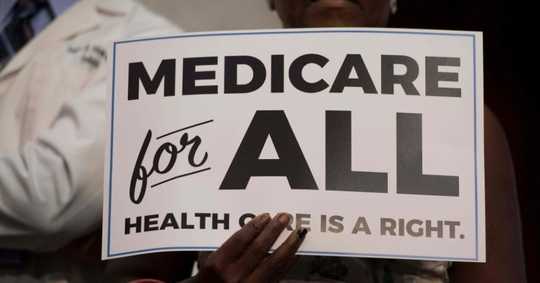Across the political spectrum, there is near consensus among these economists that a single-payer system would save money.

Proponents of single-payer healthcare have another study to push back against cost concerns. (Photo: Jim Watson/Getty Images)
A comprehensive new study that reviewed nearly three decades of existing analyses shows implementation of a single-payer healthcare system like Medicare for All could dramatically reduce costs in the United States, with savings likely experienced in the first year and definitely over the longer term.
"At this point, the most expensive health care plan is the status quo."
—Dr. Adam Gaffney, PHNP
The meta-analysis, published Wednesday in the PLOS Medicine journal, reviewed 22 existing studies of state and national single-payer healthcare proposals.
Christopher Cai, a third-year medical student at the University of California at San Francisco and the primary author of the study, explained in a statement that the economic findings were similar regardless of ideological perspective.
"The most important conclusion from our study is that there is near consensus among that single-payer would save money, both in the first year of implementation and in the long term," Cai told Common Dreams. "These findings held true regardless of the political affiliation of study authors."
Of the 22 studies reviewed, 19 of them, or 86%, showed that healthcare costs would be reduced in the first year. All showed savings within a decade.
According to a UCSF press release announcing the study:
The researchers were able to estimate longer-term savings by using cost projections made in 10 of the models, which looked as far as 11 years into the future. These studies assumed that savings would grow over time, as the increases in healthcare utilization by the newly insured leveled off, and the global budgets adopted by single payer systems helped to constrain costs. By the tenth year, all modeled single payer systems would save money, even those that projected costs would initially increase.
The study concludes with a call to implement the systems, saying that "the logical next step is real-world experimentation."
The cost savings benefit of a single payer healthcare system has long been an argument in favor of moving the U.S. away from private insurance. Sen. Bernie Sanders (I-Vt.) has put Medicare for All at the center of his presidential campaign and made the issue a key part of the 2020 Democratic primary. At a primary debate on Tuesday night, moderators continually asked Sanders and other Democrats about the costs of such a policy.
According to the study's researchers, however, cost should be the least concerning aspect of moving towards Medicare for All.
"Even though they start with different single designs and modeling assumptions, the vast majority of these studies all come to the same conclusion," said UCSF Institute for Health Policy Studies professor James G. Kahn. "This suggests that fears that a single-payer system would increase costs are likely misplaced."
In comment to Common Dreams, Cai expressed hope that "public officials will draw on this research to spread accurate information."
"It's natural for the public to be skeptical of change and debate is healthy," said Cai. "Yet as physicians and researchers we want the discussion to be evidence-based, and we want the best for our patients."
Dr. Adam Gaffney, president of Physicians for a National Health Program, which advocates for Medicare for All, told Common Dreams that the costliest system is the current one.
"The numbers speak for themselves," Gaffney said in response to the new study.
"Even studies by conservative and libertarian think takes conclude that Medicare for All will reap enough administrative savings to cover the uninsured and upgrade coverage for everyone else," Gaffney said. "At this point, the most expensive health care plan is the status quo."
Cai said that the way forward involves making a fundamental change to the U.S. healthcare system in order to enjoy the benefits of lower costs.
"Replacing for-profit private insurance with a robust public system is essential to achieving these savings," said Cai.
About The Author
Eoin Higgins is senior editor and staff writer for Common Dreams. Follow him on Twitter: @EoinHiggins_
This article originally appeared on Common Dreams
Remember Your Future
on the 3rd of November
Learn about the issues and what's at stake in the November 3, 2020 US Presidential election.
Too soon? Don't bet on it. Forces are conniving to stop you from having a say in your future.
This is the big one and this election may be for ALL the marbles. Turn away at your peril.
Only You Can Prevent 'Future' Theft
Follow InnerSelf.com's
"Remember Your Future" coverage
Related Books:
The Body Keeps the Score: Brain Mind and Body in the Healing of Trauma
by Bessel van der Kolk
This book explores the connections between trauma and physical and mental health, offering insights and strategies for healing and recovery.
Click for more info or to order
Breath: The New Science of a Lost Art
by James Nestor
This book explores the science and practice of breathing, offering insights and techniques for improving physical and mental health.
Click for more info or to order
The Plant Paradox: The Hidden Dangers in "Healthy" Foods That Cause Disease and Weight Gain
by Steven R. Gundry
This book explores the links between diet, health, and disease, offering insights and strategies for improving overall health and wellness.
Click for more info or to order
The Immunity Code: The New Paradigm for Real Health and Radical Anti-Aging
by Joel Greene
This book offers a new perspective on health and immunity, drawing on principles of epigenetics and offering insights and strategies for optimizing health and aging.
Click for more info or to order
The Complete Guide to Fasting: Heal Your Body Through Intermittent, Alternate-Day, and Extended Fasting
by Dr. Jason Fung and Jimmy Moore
This book explores the science and practice of fasting offering insights and strategies for improving overall health and wellness.
care























